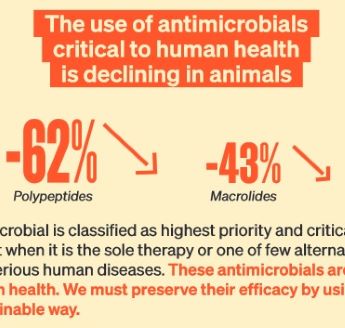WOAH VI Annual report: Antimicrobials in animals are declining around the world
The World Organization for Animal Health (WOAH) has published the 6th annual report on the health situation of 160 countries around the world.
The WHOAH report found encouraging trends against antimicrobial resistance around the world. In fact, the use of antimicrobials in animals around the world, overall, decreased by 27% between 2016 and 2018.
The same progress has been found in the reduction of antibiotics used to promote growth, a type of use prohibited in Europe, but still permitted in some Third Countries.
Worldwide, WOAH reminds, the use of antibiotics in healthy animals to stimulate growth is no longer a practice in almost 70% of the countries that have joined the report.
Auxinic use globally will be further reduced by the upcoming bans that the EU is about to apply to Third Countries exporting products of animal origin.
The report refers to a Lancet study where it is highlighted that about 1.27 million people died in 2019 due to bacteria resistant to antibiotic drugs. However, "the percentage of these deaths related to antimicrobial resistance in animals still remains unclear."
The final recommendations are addressed to the scientific community which should:
Use of antimicrobials in animals trends downwards, new report says
Source: ANMVI
© IZSAM July 2022
|
|
Istituto Zooprofilattico Sperimentale
dell'Abruzzo e del Molise "G. Caporale"
Campo Boario | 64100 TERAMO | ITALIA
Telefono 0039.0861.3321 | Fax 0039.0861.332251
e-mail: archivioeprotocollo@izs.it
Posta elettronica certificata: protocollo@pec.izs.it
Partita IVA: 00060330677
Codice Fiscale: 80006470670



